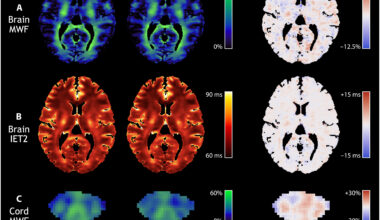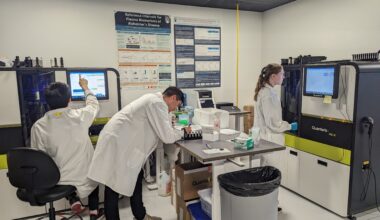The need for new therapies and state-of-the-art care for Canadians with Alzheimer’s disease has motivated three longtime friends to donate $3 million to the UBC Faculty of Medicine for research to identify ways to protect the brain as Alzheimer’s progresses.
The gift from the McArthur, Aune and Copland families will support a new project to investigate the processes that lead to oxidative stress, an imbalance of pro-oxidants and antioxidants associated with cell damage that is a hallmark of Alzheimer’s disease.
Ken McArthur, Brian Aune and Ken Copland met while working for the Canadian investment firm Nesbitt Thomson in 1968. The firm’s owner was a mentor to the friends. He encouraged them to remember where they came from and to give back where they live.
“Through business we travelled to the USA regularly. Although we were dealing with much larger institutions, we saw that Canadians are tackling global problems with equal competence, often with less funding,” says Mr. McArthur, BCom’61. “I had to look no further than my alma mater to find world-class Alzheimer’s researchers truly deserving of our support.”
“We have also seen, within our family, how Alzheimer’s affects the lives of those afflicted and those around them,” says the Aune family. “We are grateful for the chance to help lessen that suffering for affected families in any way possible by supporting a team of truly gifted experts.”
Although scientists have long known inflammatory processes in the brain are highly active in people with Alzheimer’s disease, they did not have the tools to understand how oxidative stress develops.
Two Djavad Mowafaghian Centre for Brain Health researchers—Dr. Haakon Nygaard, neurologist and Fipke Professor in Alzheimer’s Research and Dr. Brian MacVicar, professor of psychiatry and Canada Research Chair in Neuroscience—have the tools and knowledge from experience in the lab and clinic to drive this work forward.
The collaborators will use human brain neurons created from stem cells to examine the roles brain cells play in oxidative stress. Then they will look for ways to reduce oxidative stress to protect brain nerve cells from dying in Alzheimer’s patients.
“The cells we work with are derived directly from patients with Alzheimer’s disease, so they also respond in ways that are directly relevant to the brain function of patients,” says Dr. MacVicar. “Understanding the real processes that trigger oxidative stress is key to developing successful therapies for people with Alzheimer’s.”
This gift is strengthening collaboration between clinician-scientists and basic scientists to better understand the causes of Alzheimer’s disease and speed up the development of new therapies.
“Our philanthropic partners are critical to the UBC Faculty of Medicine’s success in accelerating the translation of scientific discoveries into clinical practice to create a more equitable and sustainable health care system,” says Dr. Dermot Kelleher, dean of UBC’s faculty of medicine and vice-president, health, at UBC. “The generosity of these donors is mobilizing British Columbia’s incredible strength in brain health to launch new transdisciplinary team research with great potential to transform people’s health.”
“We are grateful for this philanthropic investment in the future of brain health,” says Dr. Nygaard. “Our research efforts to protect brain nerve cells is absolutely critical as we strive to preserve the memory, mobility and overall well-being of our patients with Alzheimer’s, so they may remain the people their families know and love for as long as possible.”
This story was originally published on the Faculty of Medicine Giving website


